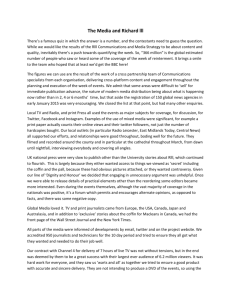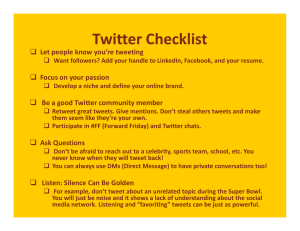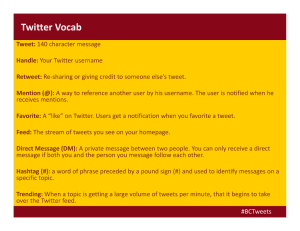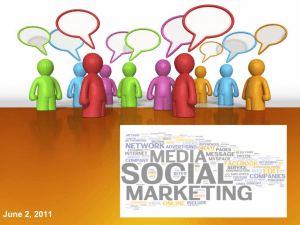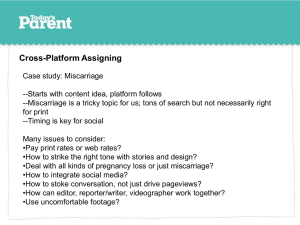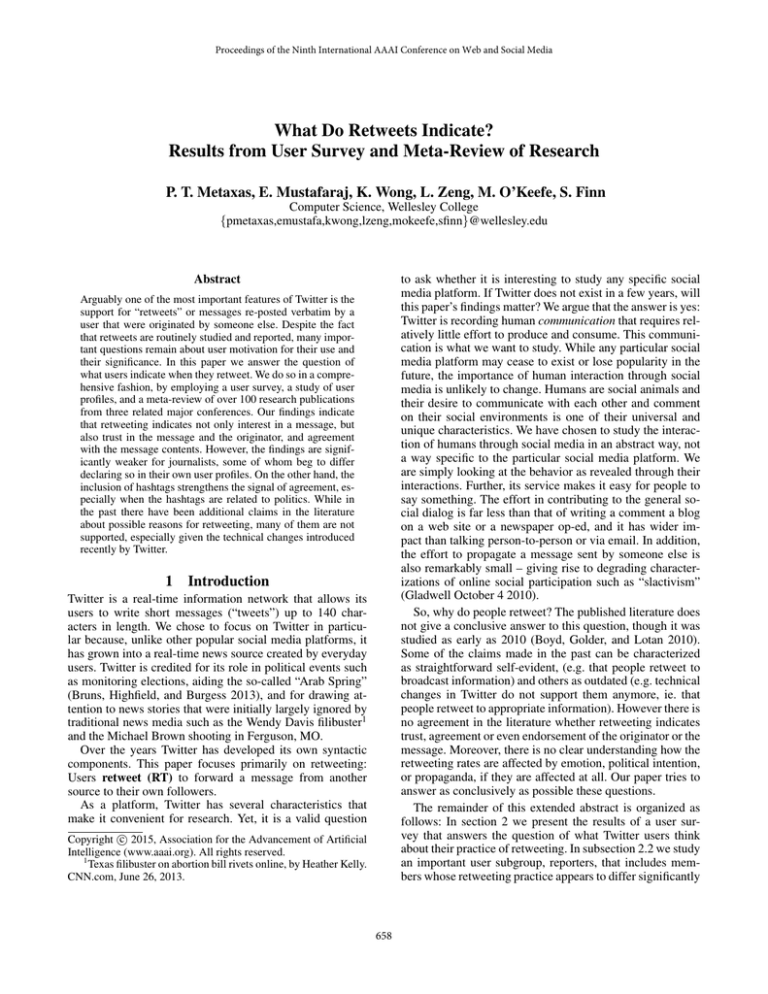
Proceedings of the Ninth International AAAI Conference on Web and Social Media
What Do Retweets Indicate?
Results from User Survey and Meta-Review of Research
P. T. Metaxas, E. Mustafaraj, K. Wong, L. Zeng, M. O’Keefe, S. Finn
Computer Science, Wellesley College
{pmetaxas,emustafa,kwong,lzeng,mokeefe,sfinn}@wellesley.edu
Abstract
to ask whether it is interesting to study any specific social
media platform. If Twitter does not exist in a few years, will
this paper’s findings matter? We argue that the answer is yes:
Twitter is recording human communication that requires relatively little effort to produce and consume. This communication is what we want to study. While any particular social
media platform may cease to exist or lose popularity in the
future, the importance of human interaction through social
media is unlikely to change. Humans are social animals and
their desire to communicate with each other and comment
on their social environments is one of their universal and
unique characteristics. We have chosen to study the interaction of humans through social media in an abstract way, not
a way specific to the particular social media platform. We
are simply looking at the behavior as revealed through their
interactions. Further, its service makes it easy for people to
say something. The effort in contributing to the general social dialog is far less than that of writing a comment a blog
on a web site or a newspaper op-ed, and it has wider impact than talking person-to-person or via email. In addition,
the effort to propagate a message sent by someone else is
also remarkably small – giving rise to degrading characterizations of online social participation such as “slactivism”
(Gladwell October 4 2010).
So, why do people retweet? The published literature does
not give a conclusive answer to this question, though it was
studied as early as 2010 (Boyd, Golder, and Lotan 2010).
Some of the claims made in the past can be characterized
as straightforward self-evident, (e.g. that people retweet to
broadcast information) and others as outdated (e.g. technical
changes in Twitter do not support them anymore, ie. that
people retweet to appropriate information). However there is
no agreement in the literature whether retweeting indicates
trust, agreement or even endorsement of the originator or the
message. Moreover, there is no clear understanding how the
retweeting rates are affected by emotion, political intention,
or propaganda, if they are affected at all. Our paper tries to
answer as conclusively as possible these questions.
The remainder of this extended abstract is organized as
follows: In section 2 we present the results of a user survey that answers the question of what Twitter users think
about their practice of retweeting. In subsection 2.2 we study
an important user subgroup, reporters, that includes members whose retweeting practice appears to differ significantly
Arguably one of the most important features of Twitter is the
support for “retweets” or messages re-posted verbatim by a
user that were originated by someone else. Despite the fact
that retweets are routinely studied and reported, many important questions remain about user motivation for their use and
their significance. In this paper we answer the question of
what users indicate when they retweet. We do so in a comprehensive fashion, by employing a user survey, a study of user
profiles, and a meta-review of over 100 research publications
from three related major conferences. Our findings indicate
that retweeting indicates not only interest in a message, but
also trust in the message and the originator, and agreement
with the message contents. However, the findings are significantly weaker for journalists, some of whom beg to differ
declaring so in their own user profiles. On the other hand, the
inclusion of hashtags strengthens the signal of agreement, especially when the hashtags are related to politics. While in
the past there have been additional claims in the literature
about possible reasons for retweeting, many of them are not
supported, especially given the technical changes introduced
recently by Twitter.
1
Introduction
Twitter is a real-time information network that allows its
users to write short messages (“tweets”) up to 140 characters in length. We chose to focus on Twitter in particular because, unlike other popular social media platforms, it
has grown into a real-time news source created by everyday
users. Twitter is credited for its role in political events such
as monitoring elections, aiding the so-called “Arab Spring”
(Bruns, Highfield, and Burgess 2013), and for drawing attention to news stories that were initially largely ignored by
traditional news media such as the Wendy Davis filibuster1
and the Michael Brown shooting in Ferguson, MO.
Over the years Twitter has developed its own syntactic
components. This paper focuses primarily on retweeting:
Users retweet (RT) to forward a message from another
source to their own followers.
As a platform, Twitter has several characteristics that
make it convenient for research. Yet, it is a valid question
c 2015, Association for the Advancement of Artificial
Copyright Intelligence (www.aaai.org). All rights reserved.
1
Texas filibuster on abortion bill rivets online, by Heather Kelly.
CNN.com, June 26, 2013.
658
2.1
from that of the general user. We also present an analysis
of user profiles that include a disclaimer about retweeting
not indicating endorsement. Section 3, truncated in this extended abstract, presents a meta-review of research papers
from three major conferences. Finally, section 4 has our conclusions.
2
Survey Results
We launched the study by utilizing our social links and
reached directly audiences, primarily in academic and ethnic
communities that we had social and professional links (Twitter, Facebook, Linkedin and email). Reflecting on the mode
of launching our survey, the responders’ sample (n=316)
was highly educated, with 25.3% possessing a Bachelor’s
degree and an additional 43% a Master’s Degree or higher.
Of the responders, thirty-three (11.4%) identified themselves as bloggers, journalists, or reporters.
Our sample was representative of both males (43%) and
females (54.4%), with 2.6% choosing not to disclose gender. In terms of ethnicity, we left it as an open-ended question and recorded participants responses as Caucasian/White
(46%), Asian or Pacific Islander (11%), Black (3.8%), other
(22%), and non-reporting (17%).
The age demographics of our data is consistent with Pew’s
report of Twitter users2 on several respects. Reflecting the
similar trend that younger individuals tend to be on social
media platforms more than older ones, including Twitter,
38.6% of the participants report being under the age of 24,
25.9% between 25-34, 13.9% between 35-44, 12.3% between 45-54, and 9.2% over the age of 54. Additionally, our
data captured users who use Twitter on average as 42.2% of
participants use Twitter daily, 23.8% use it weekly, and 34%
use it monthly or less. 55.7% have less than one hundred
followers while 8% have over one thousand. 40% of participants provided their Twitter handle. Figure 1 summarizes
some of our results about participants primary motivations
for using Twitter and their retweeting behavior.
User Survey
In mid-July 2014, we conducted a survey asking Twitter
users about various aspects of their retweeting behavior. The
survey responses indicated that there is general consensus on
several important factors that the majority of Twitter users
consider when deciding whether or not to retweet a given
message. However, we also found that there were also significant variations across subcategories of users, including
differences across the responses from reporters and nonreporters, individuals interested in politics, users of different ages, and users who use Twitter with different levels of
frequency.
We designed a comprehensive twenty-one item questionnaire (http://bit.ly/TwitterUsageSurvey) that
asked participants about their retweeting behavior. Initial
survey questions inquired about whether the participant had
a Twitter account, and if so, for how long. Other questions
relating to general Twitter usage included how often the participant uses Twitter, how often they tweet, why they use
Twitter, how many followers they have, and how many accounts they follow. The survey also asked participants about
what factors they find important when deciding whether or
not to follow an account on a scale from 1 (not at all) to 5
(extremely).
After answering these questions, we asked participants to
indicate how often they retweet, if at all. Only participants
who responded that they are familiar with retweeting were
led to a page of questions asking them about what factors,
both about the message and the account, they consider important when choosing to retweet a post. In terms of the message, options were whether they find the message interesting, emotionally resonant, entertaining, something they endorse, something that they agree with, something their followers might find interesting, something formative or something they find trustworthy. In terms of the account, options
were whether they find the account credible, a celebrity,
someone they know personally, someone who shares their
opinion, someone they support, or someone they trust. Both
cases were multiple-choice ending with a write-in (“other”)
option. These questions were posed as statements on a likertscale from 1 (strongly disagree) to 5 (strongly agree). They
were also asked about what is more important when they
decide to retweet: the message, the account or both.
Additionally, participants who had reported retweeting in
the past week were asked to recall certain features about
one particular retweet of their choice. These additional questions were designed to demonstrate whether users’ actual behavior is consistent with their overall impressions of their
own behavior. The final questions captured basic demographic questions about the participants including age, selfdescribed ethnicity, gender and educational level.
Figure 1: Summary of the results of our survey why people
use Twitter (top), and how often do they retweet (bottom).
When it came to retweeting behavior, the majority of participants responded that they believed that the message was
2
Pew Research Internet Project: Social Networking Fact Sheet.
Data from 2014.
659
more important than the account when choosing to retweet
a post. That is, when choosing whether or not to retweet a
tweet, they evaluated and put more significance on the textual content of the tweet than on the user who had written
the tweeted. In fact, some users even reported to not pay attention to who tweeted the post in the first place.
that the majority of participants tended to retweet posts from
accounts that they follow (vs, accounts that they do not follow) and therefore it is important to understand why they
choose to follow certain accounts in the first place.
Consistent with the hypothesis that users care about credibility and personal interest when navigating through social
media platforms for information, responses to the survey indicated that specific factors including “shares my interest”
and “trustworthiness” were most commonly cited as important factors to consider when choosing whether or not to
retweet a given account (see Fig. 2, bottom). Meanwhile,
factors such as “celebrity” and “entertainment” were not
rated as important in Twitter users’ decision-making process. Additionally, there were other factors that yielded responses similar to that of “shares my opinion” where there
was no strong opinion. The participants’ responses were
recorded from a likert-scale from 1 (strongly disagree) to
5 (strongly agree) to “agree,” “neither”, and “disagree.”
Reflecting the amount of emphasis the participants reported placing on the account as opposed to the message,
results regarding what qualities about an account are important to consider when choosing to retweet a message indicated less agreement and certainty. The criterion that seemed
most important overall was that the account is “credible.”
Our survey did not ask about how they judge whether or not
an account is credible and whether or not that is truly the
case. However, this suggests that Twitter users do care about
whether or not a given account appears trustworthy.
On the disclaimer “Retweeting does not mean endorsement” In light of the previous findings, of particular interest is the statement encountered in certain Twitter users’
profile summary that retweeting does not mean endorsement or agreement. It seems that this statement contradicts
the findings presented in this section, so we examined it in
greater depth. There are relatively few users who include
such statement. Using the Twitter Search interface for the
terms “RT, endorsement” we found 384 accounts containing
both of these terms. An exhaustive categorization of these
account showed that 197 (52.7%) of them belong to people in the Media (reporters, journalists, media producers) including 11 bloggers, 99 (26.5%) to politicians, 43 (11.5%)
to non-media related companies, 24 (6.4%) to people who
list politics in their interests, and 9 (2.4%) to academicians.
The remaining 0.5% of accounts were from people stating
that their RT is, in fact, endorsement.
We then tried to collect a comprehensive sample of such
profile statements. Using the Twitter API we collected all
the user profiles that make a statement along these lines. In
fact we found that the terms “retweet”, “RT” co-occur with
the terms “agreement” or “endorsement” in 2,585 profiles.
We randomly sampled uniformly 10% of them and found
that media-related accounts comprised 52.65% and 12.65%
to politicians. There is an over-representation of journalists,
reporters and media producers who include this disclaimer
in their profiles. Other journalists have challenged this practice3 since its inclusion in one’s profile is not an effective
Figure 2: (top) 94% of survey participants indicate that personal interest in a message is the primary reason for retweeting. Reasons that get very strong support (about 3/4 of
users) are trustworthiness, informativeness and user agreement with a message. More than 2/3 of users also indicate
as reasons to retweet curation (interest to their followers),
message endorsement and entertaining nature of the message. Emotional resonance with the message was not viewed
as an important reason. (bottom) Participants indicated that
account credibility (76%) and trustworthiness (59%) are the
most important factors about the account when deciding to
retweet a post. Sharing opinion with and support of the originator were not viewed as important reasons, especially for
reporters. Little or no support has personal knowledge of the
originator and whether the originator was a celebrity.
Participants provided consistent responses when responding to survey questions that asked about various factors they
considered important about a given message when choosing whether or not to retweet it. The majority of participants indicated that factors such as how interesting the message is to themselves as well as their followers are important. They also cited trustworthiness, informativeness, and
whether they agree with the given message as other factors
that were important (see Fig. 2, top).
Some of the initial insights that we found helped guide our
further exploration of the data that was collected. We found
3
E.g., see Commentaries at the Washington Post
http://wapo.st/19OIcfy and NPR’s “Retweets are endorsements”
660
3
disclaimer (many people will likely miss it).
Finally, one has to consider the reason for people placing
such a clarification statement in their profile as addressing
a concern that one’s retweeting practices may be mistaken
by others. It is reasonable to argue that the mere fact of
including this disclaimer is an implicit admission by those
using it that others may mistake their intentions, because
for most people retweeting is endorsement. Journalists and
politicians may worry about the effect of their retweets on
their curated public images.
2.2
A Meta-Review of research papers
To focus our research question a bit further, we did a metareview of the research corpus that has been published in
the last several years on Twitter. Starting with abstract inspection, we collected over 100 relevant papers published
from 2008 to 2013 in three major conference venues related to the subject: AAAI ICWSM, IEEE SocialCom,
and WWW. From the initial core we expanded the coverage to references found in the papers from these three
venues. To obey the page limit, we refer the interested reader
to http://bit.ly/RT-meaning-metareview. We
simply state that our findings indicate support in the survey
results, and provide insight on how the emotions associated
with hashtags can affect the retweeting rates and visibility of
a topic being discussed on Twitter.
Reporters and Users interested in Politics
As we mentioned, several journalists on Twitter include in
their Twitter profile description a disclaimer stating that
“retweeting does not equal endorsement.” It’s almost as if
this subgroup of individuals feel a need to distinguish themselves from the attitudes and behavior of other general users
on Twitter. To see if participants in the study responded in
ways that reflected this distinction, we ran five Welch Two
Sample t-tests, as well as the Wilcoxon rank sum tests, to
confirm the t-tests. While the t-test’s assumption of normality is fairly robust, we wanted to confirm that we would generate similar results even if that assumption is not made.
There was a significant difference in the degree to which
reporters (M= 3.4, SD=1.1) versus non-reporters (M= 4.1,
SD=0.9) agreed with the statement that “When retweeting, it is important that the message is something that I
agree with,” t(32.3)=-3, p=0.006. We also found that 57%
of reporters agreed and 17.9% disagreed with the statement,
compared to 75% of non-reporters agreeing and 3.8% disagreeing with the statement.
There was also a significant difference in the degree
to which reporters (M= 3.3, SD=1.1) versus non-reporters
(M=3.9, SD=0.9) agreed with the statement that “When
retweeting, it is important that the message is something that
I endorse,” t(32.7)=-2.9, p=0.007. While 57.1% of reporters
agreed and 21.4% disagreed with the statement, 69.5% of
non-reporters agreed with the statement and 6.6% disagreed.
Finally, there was some difference in the degree to which
reporters (M= 3.7, SD=1.0) versus non-reporters (M= 4.0,
SD=0.9) agreed with the statement that “When retweeting,
it is important that the account is one that I find credible,”
t(35)=-1.88, p=0.07. While 72.4% of reporters agreed and
13.8% disagreed with the statement, 76.2% of non-reporters
agreed with the statement and 5.7% disagreed.
There was a significant difference in the degree to which
political users (M= 3.6, SD=1.1) versus non-political users
(M= 3.1, SD=1.1) on Twitter find it important to follow accounts that share their opinion, t(116)=2.7, p=0.008. While
76.1% of political users were motivated and 4.5% believed
that when choosing to follow certain accounts it was important that the accounts share their opinions, 71.6% of nonpolitical users believed it important and 5.9% did not. The
test for the difference in the amount by which political users
versus non-political users on Twitter tend to retweet accounts that they don’t follow was not significant.
4
Conclusions
While in the past there have been several claims in the
literature about possible reasons for retweeting, there was
no focused study on the issue. This paper aims to close
this gap. Employing a user survey, a study of user profiles,
and a meta-review of over 100 research publications from
three relevant major conferences, we answer the question
of what users mean when they retweet. Our findings show
that retweeting indicates, not only interest in a message, but
also trust in the message and the originator, and agreement
with the message contents. However, the findings are significantly different for journalists, who are more likely to
include a disclaimer on their user profiles that their retweeting does not mean agreement or endorsement. The inclusion
of hashtags strengthens the signal of agreement, especially
when the hashtags are related to politics.
While this study presents an extensive sample size, we acknowledge that there are limitations to this research. For example, there are under-representations of some demographic
groups and focus on a relatively highly-educated sample
which contribute to a potential limited generalizability of the
study. Additionally, there is a possibility that there is some
social desirability bias due to the nature of self-reporting.
However, we do not believe that either of these limitations
have substantial impact on our findings.
Acknowledgements
This research was partially supported by NSF grant CNS1117693 and by the Wellesley Science Trustees Fund.
References
Boyd, D.; Golder, S.; and Lotan, G. 2010. Tweet, tweet,
retweet: Conversational aspects of retweeting on twitter. In
HICSS, 1–10. IEEE.
Bruns, A.; Highfield, T.; and Burgess, J. 2013. The
arab spring and social media audiences. Am Behav Sci
57(7):871–898.
Gladwell, M. October 4, 2010. Small change: Why the
revolution will not be tweeted. The New Yorker.
http://bit.ly/YJBQgQ and http://bit.ly/1v9lBY3
661

